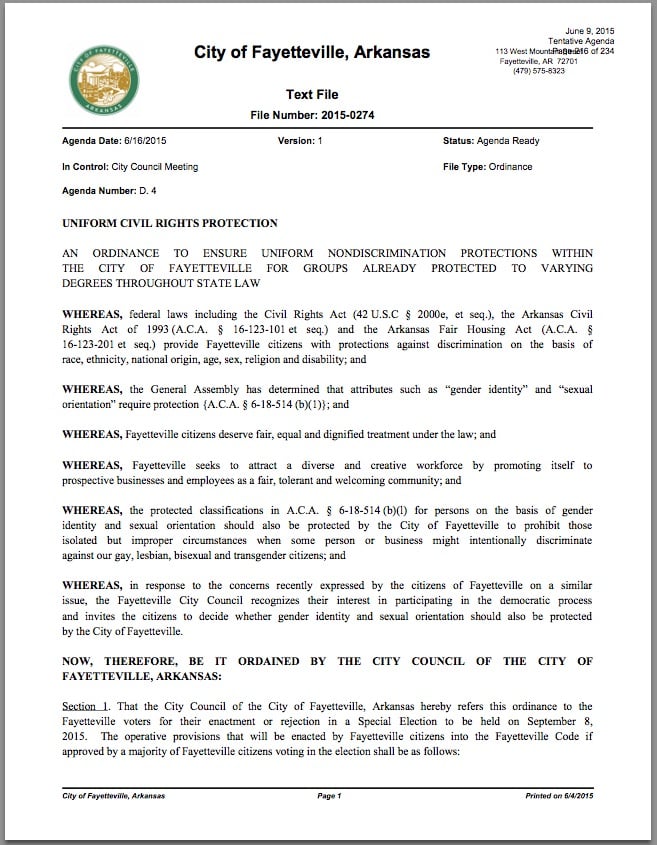Fayetteville voters can choose from any of 17 different polling sites in the Sept. 8 civil rights special election. Unlike previous elections, voters may cast ballots at any of the approved polling sites, regardless of their voting precinct.
Polls will be open from 7:30 a.m. to 7:30 p.m. on Tuesday, Sept. 8. There will be no paper ballots on election day.
To check your voter registration status, go to voterview.org and click “Registration Information.”
Polling sites:
- The Awakening (replaces Northeast Baptist Church) – 5763 E. Mission Blvd.
- Baldwin Church of Christ – 4399 E. Huntsville Road
- Buckner Baptist Church – 2748 Wyman Road
- Central United Methodist Church – 6 W. Dickson St.
- Christ’s Church – 525 W. 15th St.
- Christian Life Cathedral – 1285 E. Millsap Road
- Covenant Church – 4511 W. Wedington Drive
- First Assembly of God – 550 E. 15th St.
- First United Presbyterian Church – 695 E. Calvin St.
- Genesis Church (formerly Wiggins Memorial United Methodist) – 205 W. Martin Luther King Jr. Blvd.
- Mount Comfort Church of Christ – 3249 Mount Comfort Road
- Sang Avenue Baptist Church – 1425 N. Sang Ave.
- Sequoyah United Methodist Church – 1910 N. Old Wire Road
- St. John’s Lutheran Church – 2730 E. Township Road
- Trinity Fellowship Assembly of God – 1100 E. Rolling Hills Drive
- Trinity United Methodist Church – 1021 W. Sycamore St.
- Yvonne Richardson Community Center – 240 E. Rock St.
Visit www.co.washington.ar.us for more information about the special election, including a sample ballot.
About the ordinance
The new ordinance was approved by aldermen on June 16. As part of that approval, the ordinance will not go into effect unless voters approve the measure in a special election to be held Sept. 8.
If passed, the new law will prohibit business owners and landlords from firing or evicting someone because of their sexual orientation or gender identity. It will also provide protections for use of public accommodations, including restrooms.
Churches, religious schools and daycare facilities, and religious organizations of any kind would be exempt from the new law.
Unlike the previous repealed ordinance, the city attorney would not serve as the administrator of complaints. Instead, a Civil Rights Commission would be formed to review and decide complaints of alleged discrimination.
The commission would consist of seven members: two representatives of the business community; two owners or managers of rental property; one representative with experience in human resources or employment law; and two citizens at large, at least one of whom identifies as lesbian, gay, bisexual, or transgender.
Anyone asserting a claim of discrimination would be required to present their claim in writing to the city attorney, who would inform the Civil Rights Commission that a complaint had been received.
Informal and confidential mediation would be attempted by the city before any other enforcement measures could begin. If mediation fails, the commission would schedule a hearing to review the complaint and receive evidence. If the commission determines that discrimination had occurred, the violator would be fined up to $100 for the first offense. Subsequent violations would carry the city’s general penalty which calls for fines of up to $500. A violation would not be considered a misdemeanor or felony.



